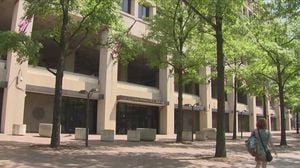Algerian President Abdelmadjid Tebboune has openly criticized the deteriorated relations with France, calling it a "toxic climate" and expressing significant concerns about the future of diplomatic ties between the two nations. His remarks, made during an interview published by L'Opinion on February 2, 2025, highlight various political tensions stemming from hostile statements by French officials and diplomatic crises prompted by France's support for Morocco's autonomy plan over Western Sahara.
"The climate is toxic. We are wasting time with President Macron," he stated, underscoring his discontent over the lack of progress between Algeria and France. He lamented, "Nothing advances except the commercial relations. Political dialogue is almost interrupted," indicating his frustration with the current state of affairs.
A significant source of discord stems from the treatment of dual nationals and Algerians living abroad. One case highlighted during the interview was of Boualem Sansal, an Algerian writer who has faced political strife and is currently incarcerated. "Boualem Sansal is not an Algerian problem," remarked Tebboune, framing Sansal's situation as rooted more within the socio-political narratives constructed by France than within Algeria itself.
Challenges have also intensified after France announced support for Morocco's autonomy plan for Western Sahara, prompting harsh reactions from Tebboune. He warned of the repercussions of such actions, stating, "On Western Sahara, I warned President Macron: 'You are making a serious mistake!'" This issue has long been contentious, casting shadows over the long-standing relationship between Algeria and France.
Echoing calls for renewed diplomatic engagement, Tebboune expressed insistences on clear commitments from the French side. He asserted, "Legal procedures must be respected," referencing recent tensions including the diplomatic spat over the influencer Doualemn, who faced expulsion under controversial claims made by French officials. "The Algerian government seeks to respect the legal framework, not to humiliate France," he explained, indicating his desire for mutual respect and dialogue.
The remarks from the Algerian president are underscored by his agreement on the necessity to renew dialogue, particularly as questions loom about the future pathways of both nations. He expressed, "It is not my role to orchestrate their statements. For me, the Republic of France is primarily represented by its president." This perspective positions the dialogue firmly within political leadership roles, urging French academics, politicians, and supporters of Franco-Algerian relations to be vocal advocates for reconciliation.
The tense backdrop to these communications reflects broader historical grievances, modern political maneuvers, and the dynamics of immigration and citizenship affecting many Algerians abroad. Tensions stemming from the colonial past still weigh on the dialogues conducted today, highlighting sensitivities surrounding national identity and historical accountability.
Notably, the political rhetoric surrounding Tebboune's comments often reflects larger narratives within Algeria targeting perceived foreign influences, noted by their attitude and accusations against retrograde elements within French politics. "Personally, I distinguish the majority of French people from the minority of its retrograde forces, and I will never insult your country," he stated firmly.
It remains to be seen whether President Macron will reciprocate with meaningful steps toward dialogue and healing of the divide, which Tebboune fears could result in long-lasting damage to the bilateral relationships. Observers and analysts may wonder if President Macron will rise to challenge the growing rifts or if Algeria will increasingly look elsewhere for alliances as the dynamics of global politics continue to evolve.
Looking forward, the Algerian administration's hope for restoring goodwill suggests potential for upcoming diplomatic engagements. Should both sides find common ground, there is opportunity for revitalizing relationships clouded by historical resentment and present crises.
With the world watching closely, the hope is for tangible gestures of reconciliation to emerge from these charged exchanges, perhaps paving the way for warmer ties and cooperative efforts beneficial for both nations. The future may very well depend on the political will of both leaders to rise above the past troubles and seek productive dialogue.



